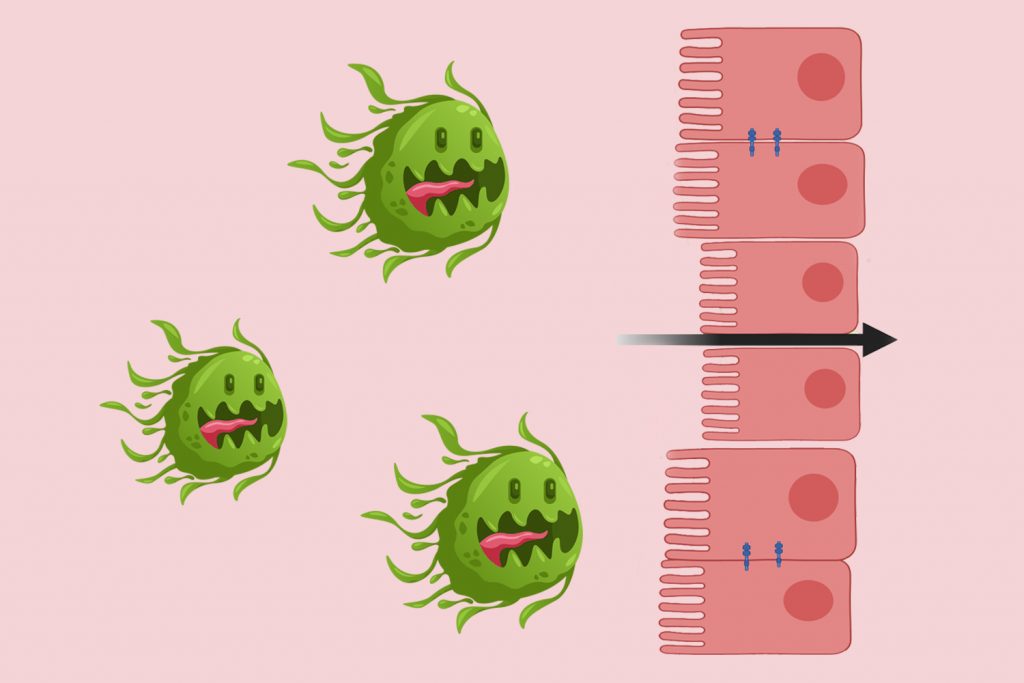21 Oct Prevention of colibacillosis: The importance of gut health

Colibacillosis is a common infectious disease and one of the main causes of economic losses in the poultry industry. Data obtained in the European Union reveals that, in broilers, colibacillosis increases mortality by 6-10%, depresses weight gain by 1-6%, worsens FCR by 3-7% and increases the production cost by 4-7%.
Colibacillosis is defined as an infection or disease caused by colon bacilli, especially E. coli. E. coli is a normal inhabitant of the digestive tract, and it is widely disseminated in the bird’s skin and feathers, feces, litter, dust and throughout the environment of the poultry house. However, only 10 to 15% of the E. coli strains are pathogenic, called Avian Pathogenic Escherichia Coli (APEC) strains.
Healthy animals do not develop colibacillosis: the disease happens when the birds are debilitated due to a previous infection, poor nutrition, toxins, or environmental stress.
Together with the respiratory system, the gut is one of the main routes of entry of APEC. The presence of APEC in the intestinal tract may not lead to disease in healthy animals, but it is important because the feces are a vehicle for the dissemination of E. coli in the environment and for its transmission to other birds. Moreover, in layers and breeders, contaminated droppings may infect the eggs at laying, leading to embryo and chick disease and mortality.
Translocation (the crossing of intestinal bacteria through the intestinal epithelium to the internal organs) only happens in the presence of stressors that disrupt the gut barrier:
- Enteritis
- Coccidiosis
- Intestinal inflammation
- Contamination by mycotoxins
- Antibiotic treatments that disrupt gut flora
- Poor microbiological quality of feedstuffs or drinking water
- Stress, including heat or cold stress, overcrowding, noises and feed changes.
Following translocation, APEC spread throughout the body, causing a generalized infection, that results in depression, fever, dirty vents and high mortality, with sudden death.
The importance of maintaining gut health to prevent colibacillosis
For all the above reasons, maintaining digestive health is key in a good prevention program against colibacillosis. It is necessary to focus on three main points:
1. Keep the counts of E. coli in the gut under control
To reduce the risk of colibacillosis, it is first important to keep the counts of Escherichia coli in the gut under control.
The period from hatching to the third day is critical because the intestinal flora is developing, there is little bacterial diversity, and the microbiome is basically made up of Enterobacteriaceae, including Salmonella, Klebsiella, Proteus, and Escherichia coli. APEC strains can reach the chick, either because the egg was contaminated, or through water, feed, or the environment.
Administered during the first week of life, essential oils with bactericide activity reduce the counts of intestinal pathogens, including E. coli. Besides, plant extracts with prebiotic function boost the growth of beneficial bacteria and therefore indirectly cut down the population of harmful microbes. Overall, the use of phytogenics during the first week of chicks’ life helps to establish a healthy intestinal flora.
On the other hand, at any time in the bird’s life, dysbiosis leads to the overgrowth of certain bacteria such as E. coli. In previous trials, we have shown that the use of our products based on phytogenics can control dysbiosis and reduce the counts of coliforms / E. coli in the small intestine.
2. Eliminate the risk factors that disrupt the gut barrier
Intestinal integrity is critical for maintaining the physical barrier that separates the intestinal lumen from the bloodstream and protects the body against translocation, dissemination of APEC and systemic colibacillosis.
All the factors that disrupt the gut barrier function, such as infections, contamination by mycotoxins, inflammation, oxidative stress, … should be reduced as far as possible.
The routine administration of plant extracts improves immune response and intestinal morphology, has anti-inflammatory effects, and increases the expression of tight junctions, reinforcing the gut barrier function.
3. Monitor water and feed hygiene
Contaminated feed and drinking water can be sources of APEC for a flock.
Water should be routinely tested for fecal coliforms and treated with a suitable disinfectant when fecal coliforms are detected (the result of the fecal coliforms determination should be 0 CFU/ml – non detected). The addition of an acidifier like DigestoCid© is recommended.
Feed treatments, such as the exposure to heat during feed manufacturing and the addition of preservatives, reduce the count of E. coli, but feeds may be re-contaminated during transport or in the farms. Levels of Enterobacteriaceae higher than 300 CFU/g are an indicator of fecal contamination.
Products of choice
DigestoCid© has a broader spectrum of action than products based solely on organic acids, allowing superior antibacterial and antifungal efficacy at a less acidic pH (5.5-6.5).
GrowthPlus© is added to feed to maintain and improve digestive health. It is formulated with synergistic ingredients:
- Bactericidal and fungicidal plant extracts, combined with organic acids for better effectiveness, that reduce the number of pathogenic microbes in the digestive system.
- Plant extracts with prebiotic effect, that promote the growth of beneficial bacteria in the gut.
- Immunostimulant and antioxidant plant extracts.
- Silicates with mycotoxin binding function.
It is especially useful in cases of gizzard diseases, necrotic enteritis, feed passage and other enteritis. It is also used as a natural growth promoter and to replace antibiotic growth promoters.
PlusProtect Digestive© is intended for digestive health in birds and rabbits of all ages. It is formulated with synergistic ingredients:
- Essential oils with bactericidal and fungicidal activity
- Plant extracts with prebiotic effect.
- Immunostimulant and antioxidant essential oils
PlusProtect Digestive© is useful to improve gut health in the following cases:
- Candidiasis in beak, crop and gizzard
- Bacterial infections in gizzard. In severe cases, it is better to give together with our PlusBind© line (mycotoxin binders)
- Bacterial infections in the intestines (necrotic enteritis; E.coli; Salmonella sp.)
- General digestive imbalances, such as feed passage.
Do not miss any of our articles!
Subscribe to our monthly newsletter

Certain health statements may not be applicable in your region.

